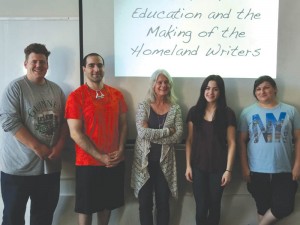
Photo: Aramayis Orkusyan
Diana Gasparyan
Staff Writer
The Armenian Studies Program at Fresno State offers many opportunities for students and the public to learn about Armenian history and culture through its Armenian Studies Lecture Series and the Kazan Visiting Professorship. The Henry S. Khanzadian Kazan Visiting Professorship provides support that allows the Armenian Studies Program to invite an internationally recognized scholar in contemporary Armenian affairs to teach a one-semester topics course related to Armenian history, the Armenian Genocide, and the formation of the Armenian Republic. In addition to their teaching responsibilities, Kazan Visiting Professors conduct research and present three public lectures as part of the Armenian Studies Program Spring Lecture Series.
For the Spring 2016 semester, the Armenian Studies Program appointed Dr. Roberta Ervine, a Professor of Armenian Studies at St. Nersess Armenian Seminary, as the 12th Kazan Visiting Professor. Dr. Ervine’s course, “Great Tragedy and Great Ideas: Learned Armenians and the Genocide,” examines the values of the Armenian people in the years following the Armenian Genocide.
“The traditional Armenian understanding of life has deep ancient roots. How did it not only survive but thrive in the harsh climate of the post-genocide world? How did it adapt to devastating psychological, spiritual, and physical upheaval?” are the types of questions Dr. Ervine is exploring with her students this semester.
The small size of the class allows for more in-depth and one-on-one discussions. The students are able to engage in the material with Dr. Ervine as well as with each other. Explaining her approach to teaching, Dr. Ervine stated, “It’s a mix of lecture and discussion because there is a lot of material that the students won’t have access to unless I give it to them. I also like to hear from my students. I want them to have a relationship with the material. I want to expose my students to something they may otherwise not get to see. I want to open a window to information that is difficult to access for my students.”
Students have had a positive reaction to Dr. Ervine’s teaching style. Anna Sislian, who grew up and lived in Yerevan, Armenia, commented on her experience, “It’s very intimate—we talk, and we discuss the material.” Sislian also remarked on how much more information she has learned about the Genocide in this class than she did growing up in Yerevan. “We go deeper into the years of the Genocide, what people were thinking then, not just the historical facts. In Armenia we learn about the Genocide, but none of the perspectives of the people in the Armenian communities.”
Lucie Ekezyan, remarking on the amount of new information she is learning in the class, stated “Dr. Ervine has opened up a world that we didn’t know existed, such as the pre-Genocide diaspora.
The students share a desire to discover more about their Armenian heritage. “It is a required course [for the Armenian Studies minor], but if I had the choice, I would still take it,” said senior Zhora Pogosyan.
For Dr. Ervine, the topic of the course is one that she herself is very interested in. “I picked something I had been wanting to look into,” said Dr. Ervine. “It’s been a lovely opportunity for me to go back into all the literature and pull out different themes of what people would be thinking about then, and what they would want to communicate to us,” concluded Dr. Ervine.
 Hye Sharzhoom Armenian Action
Hye Sharzhoom Armenian Action